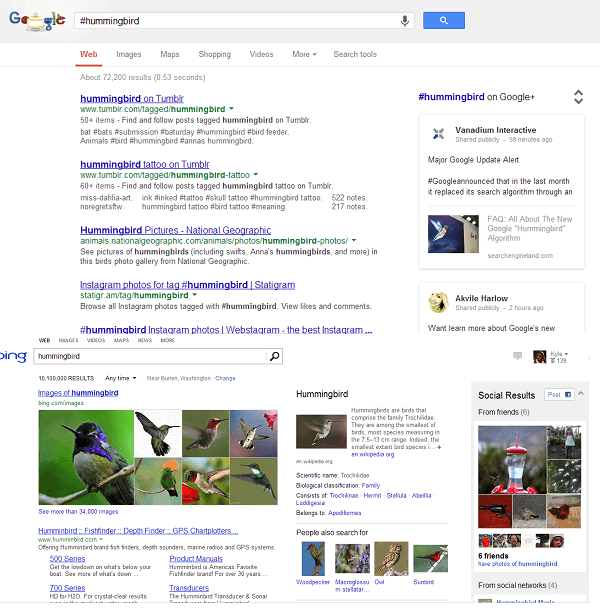Google Hummingbird itself isn’t a big deal. It’s already been in place and rolled out and formally announced. The algorithm changes have been coming and Google telegraphs these updates before they happen so their users can adapt. If you have a forward-thinking strategy, the algorithm updates shouldn’t upset you too much. If you didn’t adopt a forward thinking SEO/Content strategy after Penguin & Panda you really haven’t been paying attention.
It’s more of the same from Google, more social integration with Google+, Knowledge graph search improved to handle comparisons,
It was more than a little alarming to see that the growth of secure search and keyword (not provided) was increasing so quickly. That many people created Google accounts and know how to set their search to secure?
It’s going to be the default moving forward.
It’s not because of PRISM or the NSA
Encrypted search isn’t going to keep the NSA out. It’s almost laughable to think that the NSA can’t break that encryption.
If Lavabit is any indication of standard operating procedure from the NSA, Google probably didn’t feel like they had much of a choice other than to let NSA spooks and contractors snoop through your Gmail. Lavabit shut down over this. Google can’t just be shut down, there’s a board, investors, billions of dollars, etc. Lavabit was shut down on the decision of one person
It appears increasingly likely that Google was paid for this arrangement. Or possibly trying to work out a deal on some of their various court battles, including two separate large-scale wire-tapping cases, one involving AdWords in Gmail and another involving the Google Streetview car sniffing open WiFi.
We may never know if the NSA needed to buy AdWords or not to get this information. We many never know.
Organic SEO is Dead
Not really, but it felt good to say it.
It has never been more clear to me that Google is willing to do almost anything to get rid of keyword spam. Their commitment is commendable but their tactics are a tad draconian. It is going to be impossible to determine return-on-investment (ROI) on organic search terms, only organic search as a whole.
Meaning, it’s going to be very difficult to prove value for clients, which is going to make it more difficult to retain and recruit clients and compete with other forms of advertising that give a more verifiable ROI.
Here are your AdWords Keywords and a bucket of anonymous searches.
It seems the best strategy in this environment is to focus on page health and conversions not necessarily traffic in bulk. You can get keyword data from Google Webmaster Tools that can be your keyword methadone.
Looking Forward
The rest of the web is moving to https:// and it’s usually hailed as a good thing. We all value our privacy, and Google gets a lot of secret wishes in it’s search box. And the future of search is going to be about things not strings. Social is going to be a big part of that.

I actually had a good laugh when I saw how much some of the new SERPs looked like Bing. Microsoft must be doing something right to get Google to copy them back, hashtag hilarious.
Google’s 15th anniversary was this week. I’m old enough to remember what things were before Google and I have to admit that the web has come incredibly far and in no short part due to Google providing Webmaster Tools, Google Analytics, PageSpeed, and AdSense to webmasters.
That said, Google may have hit their apex of influence as a company. They were damaged badly by the NSA news along with the rest of the search providers. You can see that their broadness and complexity of a company that large and varied is difficult to manage and inherently risky.
Google has been really good at taking incremental steps forward, so good at it you can barely notice how much they have changed. It may be time for leadership at Google to take a step back and evaluate where the company is before their next incremental step takes them off of a cliff.




